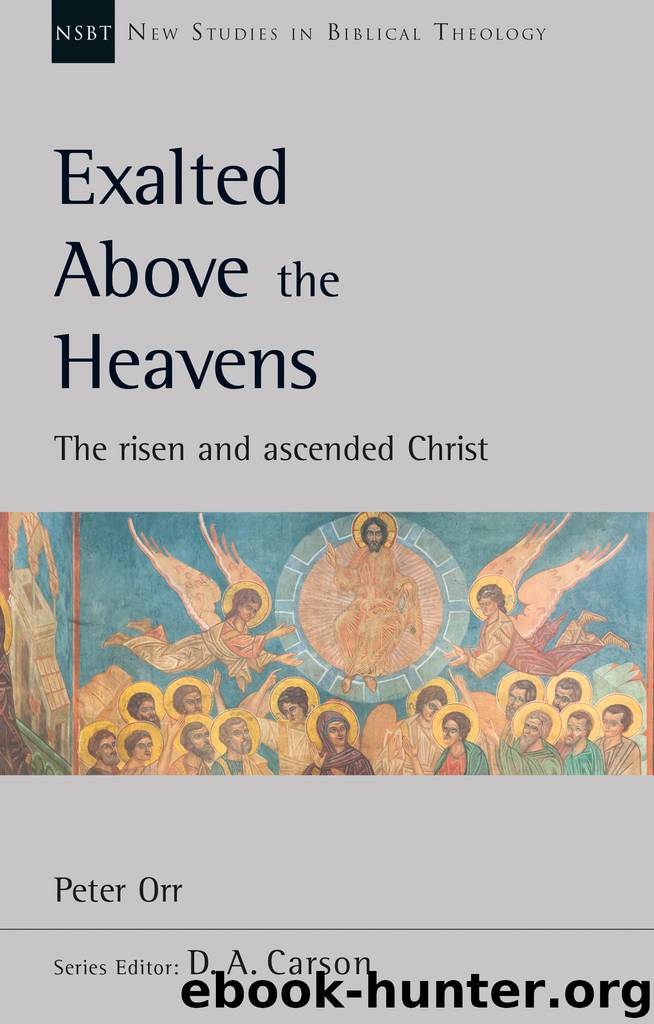Exalted Above The Heavens by Orr Peter;

Author:Orr, Peter;
Language: eng
Format: epub
ISBN: 5580986
Publisher: IVP
Published: 2018-10-02T16:00:00+00:00
Christ’s current bodily absence (2 Cor. 5:6–9)
In 2 Corinthians 5:6–8 Paul reflects on the current location of believers relative to Christ,34 namely that as long as they are ‘at home in the body’, they are ‘away from the Lord’.35 Verse 8 repeats the thought of verse 6 in negative terms so that there is an antithetic parallel between
Paul’s statement in 5:6b provokes an exasperated reaction in many commentators. The language of being ‘at home’ (endēmeō) and ‘away’ (ekdēmeō) suggests that a spatial absence from Christ is in view.36 But, as Thrall asks, ‘[h]ow can the Christian living [in Christ] (cf. 5:17) be said to be absent from Christ’s “presence”’?37 Murphy-O’Connor labels the verse ‘one of the most problematic statements in the Pauline letters’ given that it seems to contradict
one of the most basic tenets of Pauline theology, namely, that the whole being of believers is infused with the grace of Christ (2 Cor.12:9), which has reconciled them with God (2 Cor.5:19), and which progressively transforms them into the image of Christ (2 Cor.3:18).38
Before examining these verses in detail, we need to sketch the context. In a letter where Paul spends considerable time discussing his suffering as an apostle (e.g. 2 Cor. 1:3–11), chapter 5 performs an important role in showing that this suffering is not the ultimate reality. Already Paul has affirmed that although he is outwardly wasting away, inwardly he is continually being renewed (4:16). Paul develops this idea in the present section, by specifying the hope that he has as he faces death. The beginning of chapter 5 (5:1–5) swirls with interpretative complexity. In verse 1 Paul seems to be encouraging the Corinthians in the face of death – the destruction of our earthly bodies39 – that they can be encouraged by provision of a ‘building’ from God. This could be referring to some kind of individual or corporate temporary dwelling before the parousia. However, it is perhaps more likely that Paul is speaking of the resurrection body. As Harris argues, given that the ‘earthly tent-house [oikia]’ of 5:1a refers ‘primarily, if not solely’ to the physical body, the parallelism would be destroyed if ‘the second, antithetical [house; oikia] referred to anything other than some form of embodiment’.40 Further, as he notes, the parallels with the description of the ‘spiritual body’ in 1 Corinthians 15:44 are strong. Like the body in 1 Corinthians 15:44, the body in 5:1 is envisaged as being of divine origin (‘from God’; cf. 1 Cor. 15:40, 48–49), spiritual (‘not made with hands’; cf. 1 Cor. 15:44, 46), permanent and indestructible (cf. 1 Cor. 15:42, 52–54), and heavenly (cf. 1 Cor. 15:40, 48–49).41
Paul could well be assuming in 5:2–4 a post-mortem bodiless existence for believers (an ‘intermediate state’) as they wait for the resurrection body.42 Though they are confident that they will receive their resurrection bodies, this ‘intermediate period’ would be a period of ‘groaning’ and ‘nakedness’ (5:2–3) as they long to be clothed with their resurrection bodies. Paul reminds the Corinthians in 5:5
Download
This site does not store any files on its server. We only index and link to content provided by other sites. Please contact the content providers to delete copyright contents if any and email us, we'll remove relevant links or contents immediately.
Signature in the Cell: DNA and the Evidence for Intelligent Design by Stephen C. Meyer(2871)
Real Sex by Lauren F. Winner(2847)
The Holy Spirit by Billy Graham(2769)
The Secret Power of Speaking God's Word by Joyce Meyer(2725)
The Gnostic Gospels by Pagels Elaine(2381)
Jesus by Paul Johnson(2213)
Devil, The by Almond Philip C(2188)
23:27 by H. L. Roberts(2137)
The Nativity by Geza Vermes(2107)
Chosen by God by R. C. Sproul(2046)
All Things New by John Eldredge(2041)
Angels of God: The Bible, the Church and the Heavenly Hosts by Mike Aquilina(1866)
Angels by Billy Graham(1841)
The Return of the Gods by Erich von Daniken(1831)
Knowing God by J.I. Packer(1720)
Jesus of Nazareth by Joseph Ratzinger(1696)
Evidence of the Afterlife by Jeffrey Long(1694)
The Gnostic Gospel of St. Thomas by Tau Malachi(1666)
How To Be Born Again by Billy Graham(1660)
